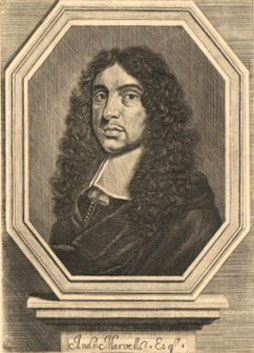сад
Источник: Английская лирика первой половины XVII века
Эндрю Марвелл цитаты
сад
Источник: стихи
Эндрю Марвелл: Цитаты на английском языке
The Garden (1650-1652)
Контексте: Meanwhile the mind from pleasure less
Withdraws into its happiness;
The mind, that ocean where each kind
Does straight its own resemblance find;
Yet it creates, transcending these,
Far other worlds, and other seas;
Annihilating all that's made
To a green thought in a green shade.
“Had we but world enough, and time,
This coyness, Lady, were no crime.”
Источник: To His Coy Mistress (1650-1652)
Контексте: Had we but world enough, and time,
This coyness, Lady, were no crime.
We would sit down and think which way
To walk, and pass our long love's day.
Stanza 1.
The Definition of Love (1650-1652)
“Thus, though we cannot make our sun
Stand still, yet we will make him run.”
Источник: To His Coy Mistress (1650-1652)
Контексте: Let us roll all our strength and all
Our sweetness up into one ball,
And tear our pleasures with rough strife
Thorough the iron gates of life:
Thus, though we cannot make our sun
Stand still, yet we will make him run.
“How fit is he to sway
That can so well obey ("Horatian Ode," 83-84),”
An Horatian Ode upon Cromwell's Return from Ireland (1650), lines 83-84; on political authority.
“Where the remote Bermudas ride,
In th' ocean's bosom unespied.”
Bermudas (1657)
“No creature loves an empty space;
Their bodies measure out their place.”
Upon Appleton House, to My Lord Fairfax.
“Art indeed is long, but life is short.”
Upon the Death of Lord Hastings (1649), last line
Вариант: "Art is long, and time is fleeting." Henry Wadsworth Longfellow, A Psalm of Life (1839).
An Account of the Growth of Popery and Arbitrary Government in England [1677] (reprinted in State Tracts: Volume I (1692), pp. 69 ff.).
Stanza 7.
The Definition of Love (1650-1652)
The Garden (1650-1652)
“To make a bank was a great plot of state;
Invent a shovel, and be a magistrate.”
The Character of Holland (c. 1653).
“An age at least to every part,
And the last age should show your heart.”
To His Coy Mistress (1650-1652)
Damon The Mower.
Upon Cromwell's Return from Ireland (1650)
